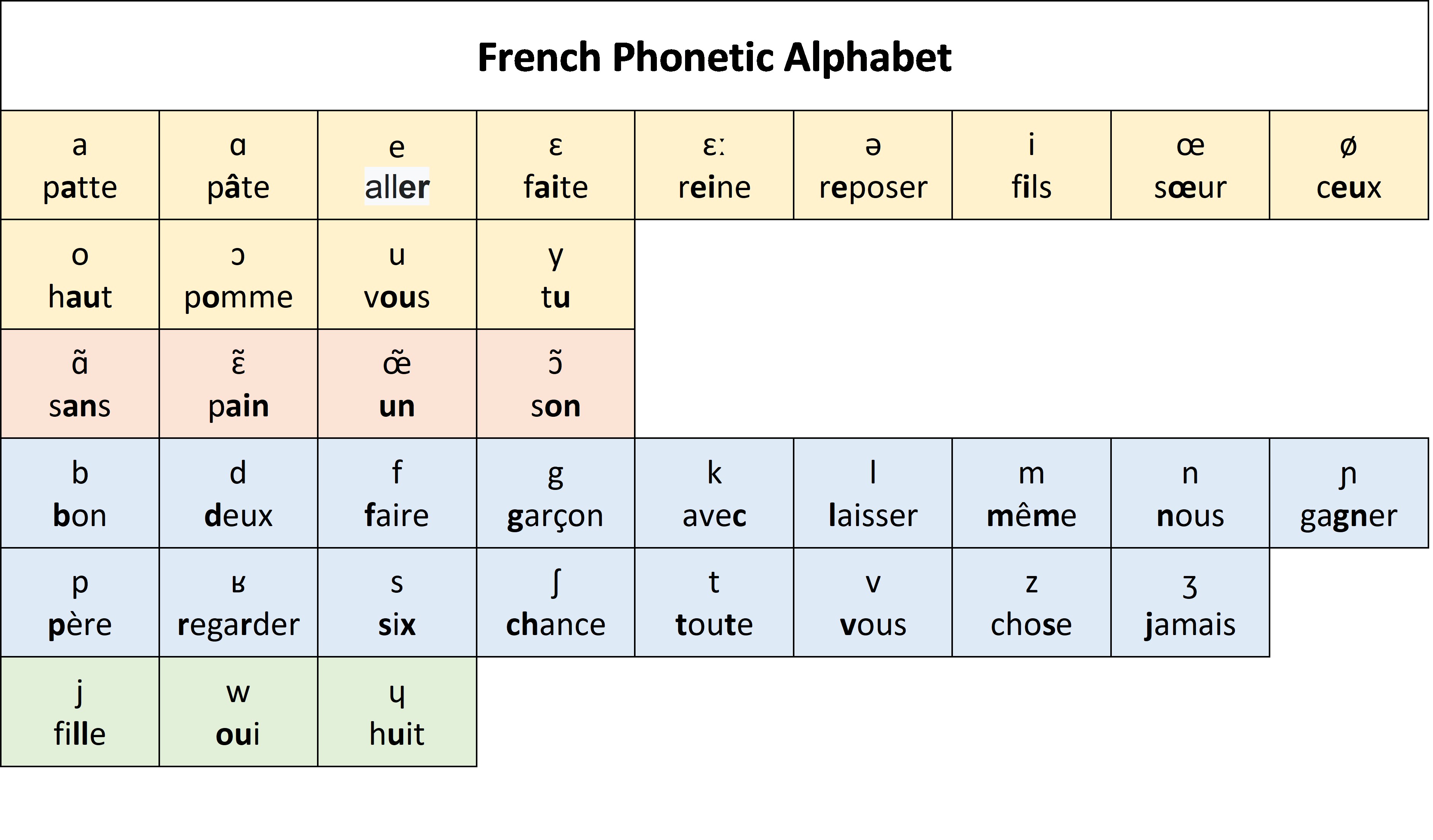French Phonetics: How to Learn and Perfect Your Pronunciation
Are you ready to take your French speaking skills to the next level? In this guide, we'll explore French pronunciation and help equip you with the tools to sound like a native speaker. To improve your pronunciation, you will need to understand a little about French phonetics, or the study of French sounds and how they are made. Don't worry if you're not familiar with the term – we'll give you a quick introduction to the French phonetic alphabet, look at the unique French sounds that cause problems for French learners, and give you some tips on how to improve your French pronunciation.
Why Good Pronunciation is Important
Have you ever found yourself in an awkward, stilted conversation with a non-native speaker of your language with poor pronunciation? Constantly asking them to repeat themselves, struggling to grasp their meaning due to their thick accent? Of course, we applaud the non-native speaker for at least making an attempt to speak our language. But poor pronunciation can turn a conversation into a trying experience. Clear and accurate pronunciation, on the other hand, improves comprehension and enhances communication.
And think about that non-native speaker with less-than-ideal pronunciation. How demoralizing must it be for them when their sincere attempts to communicate fall flat? It's disheartening! That's why good pronunciation not only boosts your confidence, but also makes you feel at ease when conversing with others in their language.
But the benefits don't stop there. Good pronunciation will also improve your listening comprehension. If you are mispronouncing sounds, chances are you’re not hearing them correctly either. Working hard on your pronunciation will see your listening skills improve dramatically too.
French Phonetics for Beginners
A bit of study of the International Phonetic Alphabet (IPA) can significantly improve your pronunciation. The IPA is a system designed to represent speech sounds and transcribe them in writing. It is particularly useful for those languages where words aren’t pronounced the way they are spelt (English is perhaps the worst offender here). It also helps distinguish the pronunciation of letters that may have different sounds in various languages. 
International Phonetic Alphabet (IPA)
Take the word "ambulance" in French, for instance. You might assume that the French pronunciation is the same as the English one since the spelling is identical. Wrong! They sound quite different in the two languages. The IPA transcribes the English pronunciation as /ˈæm.bjə.ləns/. But the French pronunciation is transcribed as /ɑ̃.by.lɑ̃s/. This transcription shows that the French “am” and “an” have a nasalised pronunciation, and that the French “u” is more distinct than the weak, unstressed sound in the English pronunciation.
In the French phonetic alphabet, there are 37 different sounds, including 17 vowel sounds. If that sounds a bit overwhelming, it might reassure you to know that French phonology is not as complicated as English, which boasts (at least) 44 unique sounds and 20 vowel sounds.
Note that the IPA system isn't a failsafe system for flawless pronunciation. For example, the T sound in both English and French is represented by the phonetic spelling /t/. However, there is a very slight difference in the pronunciation. In English, we place the tip of the tongue above the teeth against the roof of the mouth, but in French, the tongue is placed against the upper teeth. Even subtle differences like this will contribute to giving you an English accent when you speak French.
For a great introduction to French phonetics and French pronunciation, I recommend the Master Your French blog by Mylene Raad.
Tackling Difficult French Sounds
There are a handful of French sounds that are harder for English speakers to replicate, simply because we don’t have the same sound in our language.
/y/
Possibly the most difficult is the French U sound (represented in the IPA as /y/). To pronounce it correctly, your brain needs to perform some mental acrobatics. First, shape your mouth as if you were saying "O", then purse your lips and attempt to say "E". Many English speakers instead will pronounce it like the ‘ou’ sound in “soup”. The problem with that is that you will then pronounce the French words vous and vue the same way when they are quite distinct in their pronunciation.
/ʁ/
Another tricky sound for English speakers is the letter R. The IPA transcription for the English pronunciation of “restaurant” is /ˈɹɛs.t(ə).ɹɒnt/. (The upside down ‘r’ is to show that we don’t roll our Rs like say Spanish and Italian). The French IPA spelling is /ʁɛs.tɔ.ʁɑ̃/, with a kind of upside down, back-to-front capital R to show the distinct guttural sound the French make. To get a good approximation of it, place the tip of your tongue against the back of your bottom teeth, raise the rest of your tongue towards the roof of your mouth, and then produce a sound similar to the "ge" sound in "get" from the back of your mouth.
/ɔ̃/, /ɑ̃/, /ɛ̃/ and /œ̃/
The nasalized vowels in French pose another set of challenges. Although English does have nasalized sounds (think of the difference between "sin" and "sing"), the French nasalized sounds are more exaggerated. To approximate the /ɔ̃/ sound, for example, in the French word son (“sound”), try holding your nose while saying the word "saw". Obviously, the French don't go around pinching their noses while speaking. So to achieve the nasal sound try to imagine that you want the sound to come out of both your nose and your mouth.
There are four nasal sounds in French - /ɔ̃/, /ɑ̃/, /ɛ̃/ and /œ̃/, and you can practise each of them in the phrase ‘un bon vin blanc’. (Actually, most French people pronounce 'un’ the same way they would pronounce ‘in’, as the /œ̃/ sound is becoming less frequently used).
/ e/, /ɛ/ and / ɛː/
Another pronunciation challenge for English speakers lies in differentiating between the various "E" sounds: /e/, /ɛ/, and /ɛː/. While they may sound similar to English ears, they are actually distinct sounds. The /e/ sound is similar to the English pronunciation of the letter A but more clipped. So though it may be tempting to pronounce the French word for she, elle to rhyme with “bell”, it is, in fact, more accurate to say it like the English word “ale”, but making sure not to draw out the sound as we do in English. The /ɛ/ sound is akin to the pronunciation of the E in “met”, while the / ɛː/ is kind of halfway between the /e/ and /ɛ/ sounds, ie somewhere between “met” and “mate”.
Peculiarities of Spoken French
Apart from the difficult sounds you come across in French, some other distinguishing features of French pronunciation need to be learnt.
Silent Letters
French has a fondness for silent letters, especially at the end of words. In most cases, if there is a consonant at the end of a word, it's not pronounced. There are also a lot of silent Es at the end of words, though they do affect the pronunciation of the preceding consonant. For instance, take the word for "big": in its masculine form, grand, the "D" is silent. However, in the feminine form, grande, the "E" is silent, and the "D" is now pronounced.
Another letter that is silent is H, although to complicate things, it is sometimes aspirated. This can be seen when we use the definite article (le, la, or l’) before nouns beginning with an H. If it is truly silent, then the definite article is l’, eg l’hôtel. But if it is aspirated, then use le or la, eg le hamburger, even though the H itself is not pronounced.
Liaisons
A second unique feature is the use of liaisons when two separate words are sounded together as if they were one. An example is the French for “you (plural) have”: vous avez. Normally the ‘s’ in vous is silent, but because the next word begins with a vowel, the ‘s’ is sounded (in this case like a ‘z’ sound), so that the phrase is pronounced /vu.za.ve/. The good news regarding liaisons is that they follow strict rules, and if you follow the rules you can avoid pronunciation errors.
Contractions
Another peculiarity, the French like their contractions. Some contractions are reflected in spelling, for example, if je is before a word beginning with a vowel, the ‘e’ is dropped, as in j’aime. More common however are contractions in spoken French where vowels and sometimes whole words go missing. Consider the negation of verbs: in written French, "I don't speak" is je ne parle pas. Yet, in spoken French, the ‘e’ in je is silent, and the ne disappears entirely so that it sounds like j’parle pas. A more extreme example is je ne sais pas (“I don’t know”) which in casual spoken French is often pronounced shai pa, the French equivalent of “Dunno”.
Stress and Intonation
In French, word stress and intonation differ from English. Unlike English, where certain syllables receive more emphasis, each syllable of a French word is stressed the same, or perhaps with a very slight stress on the last syllable. Likewise with whole sentences, whereas an English speaker will tend to stress different parts of the sentence, notably the verbs and the nouns, the French intonation is much more even. Of course, French speakers will stress certain words for added emphasis, and, like in English, the intonation rises at the end of a sentence when asking a question. Overall, French intonation is flatter, with fewer rises and falls of the voice, giving it a more flowing sound than English.
Muscle Workout!
Unlike in English, where our muscles remain relaxed, French speakers actively engage the muscles around their mouth. If you are pronouncing French correctly then you give your facial muscles a work-out too. In fact, if you are not used to speaking French and you have a half-hour conversation in the language, your mouth and jaw should feel tired from employing muscles not normally used!
Tips and Techniques for Improvement
One of the most effective ways to improve your pronunciation is by imitating native speakers. Some people have a good ear for accents and can accurately mimic others. But everyone can improve their pronunciation, even those not so good at impersonations – it will just take a bit more effort. Resources like podcasts, YouTube videos, TV shows, movies, apps, the audio recordings of dialogues from textbooks will all help you improve your pronunciation by imitating native speakers.
However, it's important not to jump in at the deep end right away. This means you should start by listening to and imitating material that is spoken at a comfortable speed. Even when you reach an advanced level in French, it is advisable to speak clearly and at a steady pace, rather than trying to imitate the lightning-fast speech of a native Parisian. Remember, you will always have a slight trace of an accent, and speaking too quickly risks making you difficult to understand.
Another important tip is to get feedback on your pronunciation. Just repeating sentences from podcasts and videos may give you the false impression that you're doing a great job. However, we are not always the best judges of how we sound. So seek feedback from native speakers, language exchange partners, or teachers to refine your pronunciation.
Earlier in this article we looked at some of the trickier sounds to master in the French language. It’s hard to explain how to make a particular sound in a blog post, but fortunately, instructional videos on YouTube are plentiful. These short videos can be immensely helpful in improving your French pronunciation. For starters try:
Earlier in this article we looked at some of the trickier sounds to master in the French language. It’s hard to explain how to make a particular sound in a blog post, but fortunately, instructional videos on YouTube are plentiful. These short videos can be immensely helpful in improving your French pronunciation. For starters try:
You can also incorporate tongue twisters into your practice routine to target specific sounds and improve your articulation (plus exercise facial muscles that aren’t used as much in English). Additionally, recording yourself speaking French, then actively listening to identify areas for improvement can also be an effective technique.
Finally, it is common for people to feel shy and uncertain when speaking a foreign language. However, shyness won't help your pronunciation. In fact, exaggeration and embellishment can be your friends when speaking French. Renowned linguist and father of the influential Comprehensible Input theory, Stephen Krashen, sometimes shares an interesting anecdote that illustrates this point. He once encountered an Englishman during his time serving in the Peace Corps in Europe. This Englishman had studied French in school but wasn't particularly successful or enthusiastic about it. When it was time for his final French exam, he was required to give a presentation in French. The Englishman thought this was stupid and decided to make a bit of a joke of it. So he gave his presentation wearing a beret, a baguette under his arm and delivered his French presentation in an over-the-top, comic French accent. Yet when he had finished, his surprised French professor praised his presentation. The professor told him, “That was the best presentation in the class. I didn’t realise you spoke French so well”!
The moral of the story of course is that even if you feel like you are exaggerating the sounds when speaking French, even if it makes you feel a bit weird or even silly, chances are that it will sound a lot more natural to a French person than speaking with a thick English accent. So, don't be afraid to let go of inhibitions and embrace a little theatricality to enhance your French pronunciation.
Conclusion
Learning French is an ongoing, complex process that involves learning tonnes of new vocabulary, new grammatical concepts, and tuning your ear to hear new sounds. Sometimes good pronunciation gets overlooked in the learning process, but clear and accurate pronunciation can be as important as using correct words and grammar to communicate effectively with French speakers.
It is important to regularly spend a portion of your French learning time on pronunciation exercises such as repeating back dialogues, watching videos on French pronunciation, and working with language partners or tutors on improving your pronunciation. Learning a language should be enjoyable, but it should not be forgotten that it takes time and effort to progress. The Three Ps – practice, patience, and perseverance – are key to achieving mastery. The more you invest in understanding French nuances, the closer you'll come to sounding like a native speaker. So, embrace the challenge, and have fun.
Author
Nick Dennis

Nick is an English teacher who has taught English as a Foreign Language in China, Italy and France. He has a Bachelor of Arts (Modern Languages), majoring in French, from the University of New South Wales. He loves travel, reading and football and, of course, learning languages. Four years ago, Nick and his wife co-founded an online English language school targeted at the Chinese market (since sold to Chinese investors). He has also ghost-written the autobiography of a well-known Australian horse trainer.


